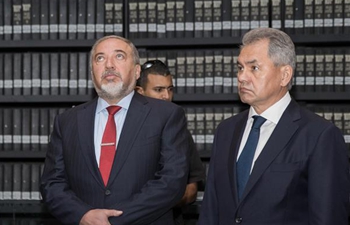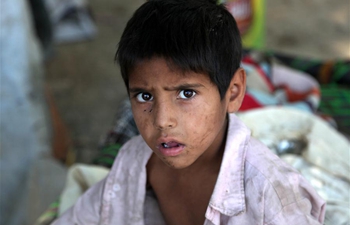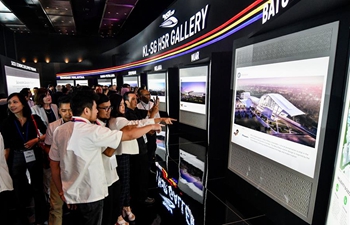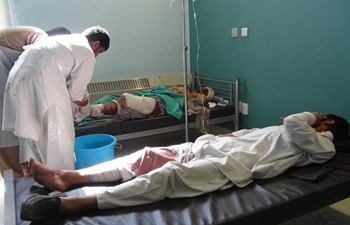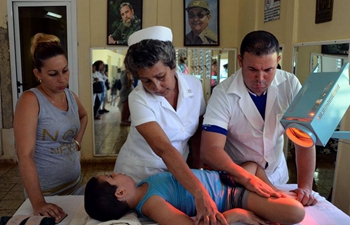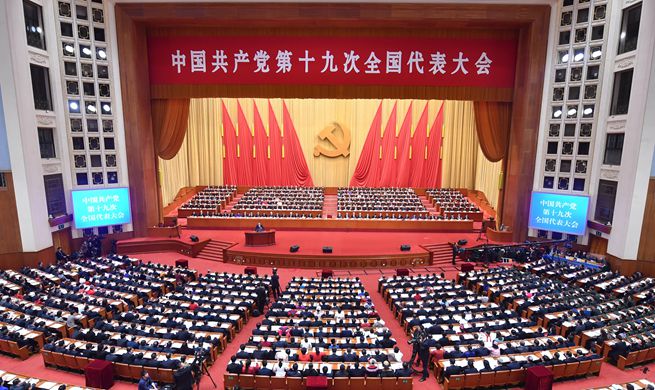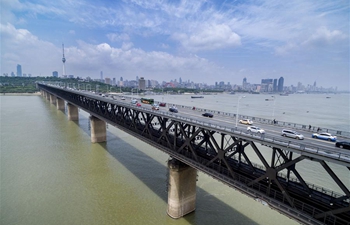by Fatima AbdulKarim
RAMALLAH, Oct. 18 (Xinhua) -- Around a thousand cinemagoers gathered in the West Bank's Ramallah Cultural Palace for the opening of an annual cinema festival titled Days of Cinema 2017, to watch a controversial Oscar nominated film by Palestinian filmmaker Annemarie Jacir.
Jacir's film, Wajib, on its avant premiere in Palestine, has spurred controversy besides its international award nomination that reveals several layers of internal Palestinian dissonance on identity representations and normalization with the suppression of Palestinians living in Israel.
"This is the audience that will understand all the details and the jokes, I hope," said Jacir, right before the screening.
The film puts together a father and son in a car ride all day long to deliver wedding invitations, through which the son, who has been living in Italy for a while, faces his father's coping strategy as a school teacher and an Arab citizen living in Israel, which is often subject to discrimination and restrictions.
The drive puts the father and son relationship at stakes at several corners of Nazareth city roads where both review life changing decisions that they've taken or those taken by the sister, who is the bride to be, and the mother who deserted them for a love affair when they were children. All of which were in search of personal comfort amidst a tensed social and political life.
On their one day long drive, they walk into several houses of relatives and friends in Nazareth, in scenes that give insight into daily people's lives and burdens.
Jacir said she was so excited to be with her "most important audience," adding that she hopes the film can be more universal.
The festival offers an opportunity for a week-long film screenings for different ages, including four Oscar nominated films in Ramallah, Nablus, Bethlehem, Jerusalem and Gaza.
Khulud Badawi, the spokesperson for the festival said "we're very proud to have this variety of films that also includes animation films for children, so we are taking about an activity that includes the whole family, from the very youngest to the very eldest."
The festival also includes workshops for young and emerging filmmakers, added Badawi, saying that "this year, unlike other years, we're talking about many international and Arab guests that came specially to meet Palestinian young filmmakers; they are well known filmmakers and producers that came specially to give the time to brainstorm with young Palestinian generation who want to be part of this cinema industry."
The other three Oscar nominated films are Insult, by Lebanese director Ziad Doueiri, The Tempestad, by Mexican directos Tatiana Huezo, and the Last of Us, by Tunisian director Alaeddin Slim.
Ola Salama and her spouse Mahmoud Franji, who attended the opening film Wajib, said they would not want to miss this opportunity to watch films because the frail culture infrastructure, especially cinema, does not allow it to become a common activity.
"I love cinema, but this culture is not spread enough. You feel that it goes through ups and downs according to the political situation and the general happenings in town, and we need more attention by everybody for cinema and not just a slice of the community that are interested in cinema," said Salama.
On the other hand, Franji believes the tradition of film festival is laying foundations for the growth of Palestinian cinema. He said "a festival like this and what they represent, that are organized by cultural organizations, is a positive introduction for change in the Palestinian society, be it from the artistic, cultural point of view or the issues it raises."
"Lately, we saw that films were screened in Gaza, West Bank and in the 48 lands (Israel) to stress the existing Palestinian people's identity, and this is the most important. It was preceded by festivals like the Red Carpet Human Rights film festival, which was an excellent idea to provoke brainstorming in human rights issues, especially as we are suffering under the occupation and get an insight into the suffering of other peoples," he said.
The 65 films to be screened in the festival are organized by Ramallah based Film-Lab organization, which is specialized in cinema, all of which are free of charge, because it targets the local community, who fundraised for the festival from domestic resources and the Palestinian business community.
Seventy percent of the festival's overall budget was fundraised locally, which signaled to many a cinema hungry approach among Palestinians and that cinema is non-exclusive.
Filmmaker Annemarie Jacir has three internationally renowned long films and several other short ones, throughout her career in cinema across the world.
Summing up her personal goals for Palestinian cinemagoers, Jacir described the moment she first heard the Palestinian accent in cinema as "moving," and therefore, a moment of realization. She said, "I understood that cinema is not just for other people, it's for us, too."




